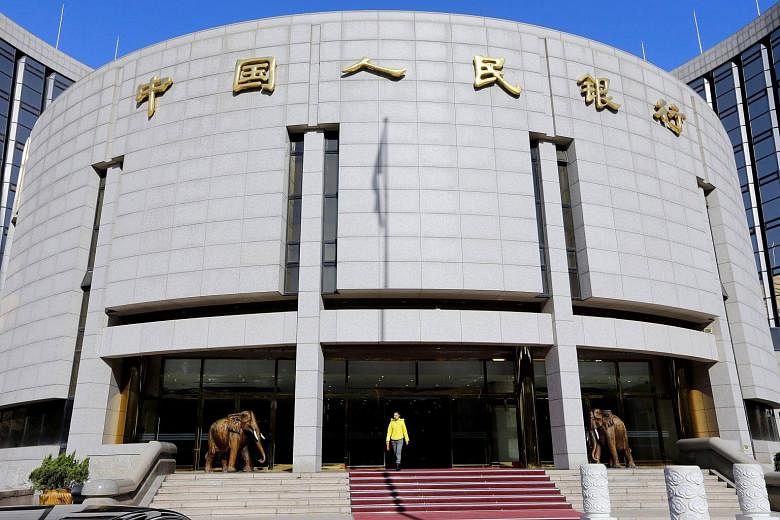HONG KONG (REUTERS) - Bankers and brokers in China are expecting a brutal bonus season over the next few weeks, as business dwindled on local stock markets last year, dragging industry profits down by half.
Data from headhunters and industry sources suggest an equities trader in China would have earned between 500,000 and 850,000 yuan (S$102,700-S$174,600) in 2016, with a 12-month bonus paid in the first half.
But this year the industry is struggling after the stock market boom came to a turbulent end in 2015 and regulators stepped in to manage the turmoil, hitting local banks and global players trying to boost their Asia business.
According to Brett Rose, head of the Shanghai branch of recruitment firm Robert Walters, around 40 percent of investment bankers on the mainland are expecting no bonus at all.
Some brokers are also planning lay-offs, having already pared back some of the perks that staff have long taken for granted, people at five brokerages and analysts said.
Shanghai-based Orient Securities, which reported a 68 per cent drop in 2016 profit, has already signalled its belt-tightening, two executives at the brokerage said.
First the free sweet treats and coffee disappeared from the pantry, then half-year bonuses were scrapped, they said, and most recently the cash advance on the annual bonus, customarily paid ahead of Lunar New Year, was slashed to a quarter for one of the sources.
"This year performance was, broadly speaking, very bad, so it's possible that (the year-end bonus) will only be half or a third of last year's," said the source.
Orient Securities has yet to respond to a request for comment.
A source at Shenwan Hongyuan Group, the fifth-largest mainland-listed brokerage, said a new policy sacking the bottom fifth of last year's performers on the business side would take effect by end-March.
Shenwan Hongyuan did not return requests for comment.
Many Chinese brokers, highly dependent on trading fees, were badly hit by a 50 per cent fall in average daily turnover in stocks and funds to 500 billion yuan last year, according to a January report by Haitong Securities.
Government restrictions on margin financing continued to weigh on trading, while crackdowns on property-related and other structured products also hit revenues.
Industry profits fell 50 per cent to 123.4 billion yuan, according to the Securities Association of China.
Staff at global banks that have bet on China to drive growth in their Asian equities trading franchises are also due to receive news of their bonuses in coming weeks.
They typically earn as much as twice their Chinese counterparts' basic pay, but they will also have to pull in their horns.
"Global banks' Asian revenues had been propped up by China's massive stock market rally in 2015, but the secondary market is down considerably from its amazing bull run, which means sales and trading compensation should be lower," said Benjamin Quinlan, CEO of Hong Kong consultancy Quinlan & Associates.
The slump in secondary market business, together with cost pressures, is likely to drag down average investment banking bonuses in Asia by 20 to 30 per cent at the worst-performing global banks, said Quinlan.
Even the best performers are likely to see bonuses fall 10 to 15 per cent, he added.
An employee at Credit Suisse Founder Securities said he was expecting a bonus of three to four months' salary, down from seven last year.
The firm also cancelled its annual party and halved employees' phone allowance, he said.
A spokesman for the Swiss bank's joint venture firm said it cancelled the party in favour of team-building events, and the new phone allowance was adequate for all but a few.
He said the firm planned to expand this year.
A source at Morgan Stanley Huaxin said some staff there were expecting a 50 per cent fall in annual bonuses.
Morgan Stanley Huaxin declined to comment.
For Chinese bankers working in the primary equity markets such as initial public offerings (IPO) and private share placements, the situation is less dire, with profits from IPOs falling just 5 per cent last year to 10.3 billion yuan, according to Haitong estimates.
At Beijing-based UBS Securities (UBSS), some IPO and private placement bankers received 12 months' bonus last year, but are expecting around 10 months this year, two people at UBSS said.
Staff in the firm's primary equity markets team are divided into three levels, with the most junior making around 420,000 yuan a year in basic pay, while a managing director could command up to 2.5 million yuan, according to one banker.
UBS declined to comment.
Primary markets executives are likely to outdo their colleagues on the trading desks again in the coming year, as money flowing into several expected IPOs may drain liquidity from the broader market, said Jiahe Chen, chief economist at Cinda Securities.

